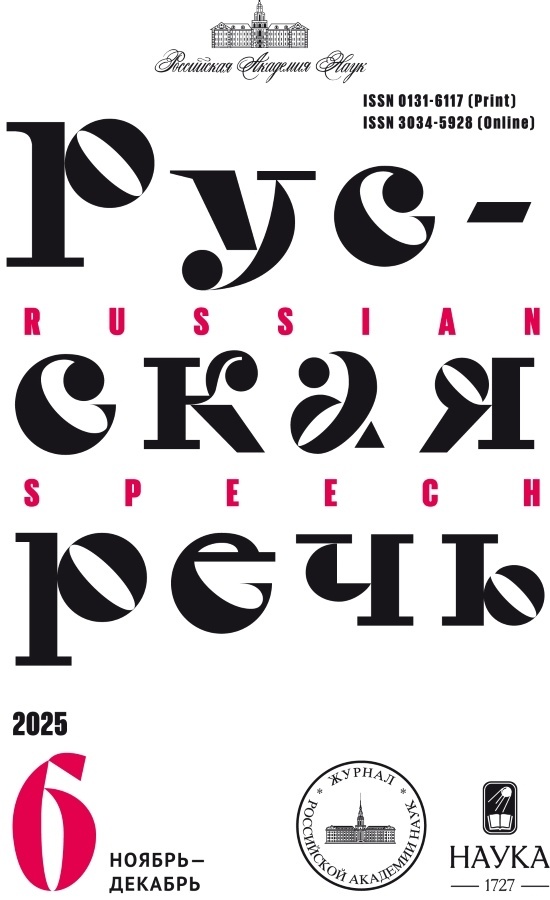Labor in the National Picture of the World of the Russian
- Autores: Kuz'minykh E.O.1, Bugakova N.B.1, Skuridina S.A.1
-
Afiliações:
- Voronezh State Technical University
- Edição: Nº 6 (2025)
- Páginas: 41-53
- Seção: Issues of Modern Russian Language
- URL: https://journals.eco-vector.com/0131-6117/article/view/696182
- DOI: https://doi.org/10.31857/S0131611725060032
- ID: 696182
Texto integral
Resumo
The lexeme trud ('labor') expresses one of the basic moral and value concepts of any culture and is an important component of the linguistic consciousness of the nation, is reflected in which are proverbs and sayings. Based on the conducted research, it is concluded that work in the worldview of the Russian people is a necessity, which is an important part of life. It is not an internal human need, but is caused by external causes. The main characteristic of labor is severity, while the degree of pleasure from receiving benefits is directly proportional to the effort invested. Hard work is often perceived as a blessing, as it helps to atone for original sin and thereby brings a person closer to God. In this sense, it is contrasted with laziness, which has a devilish nature. A sign of a lazy person is a predilection for idle conversations, aimless loitering and contemplating the work of others. The latter is satisfying. Assessing the amount of labor effort is ambivalent: both laziness and excessive zeal are condemned. The balance of work and leisure is regulated by natural rhythms and church holidays. The attitude to work determines the moral qualities of a person, the degree of his honesty. The reward for work is usually unfair, but the result brings joy. The proverbs about work lack the idea of personal enrichment and accumulation for the next generation. Work is necessary when there is a need to satisfy personal needs. Mental work is valued above physical work and is the prerogative of the older generation. The boundary between women's and men's work is natural, the latter is considered to be of higher quality. In Russian proverbs, the concept of labor correlates with such categories as respect, prosperity, wealth and poverty, laziness, idleness, skill, honesty, etc. Negative characteristics include: the unfairness of the organization and remuneration, excessive severity, large volume, routine.
Palavras-chave
Sobre autores
E. Kuz'minykh
Voronezh State Technical University
Autor responsável pela correspondência
Email: eleshka-82@yandex.ru
Voronezh
N. Bugakova
Voronezh State Technical University
Email: ya_witch@mail.ru
Voronezh
S. Skuridina
Voronezh State Technical University
Email: saskuridina@yandex.ru
Voronezh
Bibliografia
- Алексеев А. В. Культурная значимость слова труд в XX веке: рефлексы древнерусского концепта // Вестник Нижегородского университета им. Н. И. Лобачевского. 2019. No 2. С. 164-170.
- Басова Л. В. Концепт труд в русском языке (на материале пословиц и поговорок): автореф. дисс. ... канд. филол. наук / Тюменский гос. ун-т. Тюмень, 2004. 20 с.
- Гоннова Т. В. Социокультурные характеристики концепта "труд" в русском языковом сознании: дисс. ... канд. филол. наук / Волгоград. гос. соц.-пед. ун-т. Волгоград, 2003. 210 с.
- Дмитриев Д. В. Толковый словарь русского языка. М.: АСТ, 2003. 1097 с.
- Евгеньева А. П. (ред.). Словарь русского языка: В 4-х т. 3-е изд., стер. Т. 3. М.: Русский язык, 1983. 352 с.
- Ефремова Т. Ф. Новый словарь русского языка. Толково-словообразовательный. Т. 2. М.: Русский язык, 2000. 315 с.
- Кривко Р. Н. (гл. ред.). Словарь русского языка XI-XVII вв. Вып. 30. М.: Азбуковник, 2015. 320 с.
- Крысько В. Б. (гл. ред.). Словарь древнерусского языка (ХІ-ХІѴ вв.). Т. 13. М.: Нестор-История, 2023. 728 с.
- Кузнецов С. А. (гл. ред.). Большой толковый словарь русского языка. СПб.: Норинт; М.: Рипол классик, 2008. 1534 с.
- Ожегов С. И., Шведова Н. Ю. Толковый словарь русского языка: 80 000 слов и фразеологических выражений. 2-е изд., испр. и доп.. М.: АЗЪ, 1994. 928 с.
- Панченко Н. Н. Национально-специфическая интерпретация понятий "обман" / "ложь" в паремиологическом аспекте // Языковая личность: вербальное поведение: сб. науч. тр. / Под ред. Н. А. Красавского. Волгоград: РИО, 1998. С. 26-30.
- Ушаков Д. Н. Большой толковый словарь русского языка: современная редакция. М.: Дом Славянской книги, 2008. 959 с.










